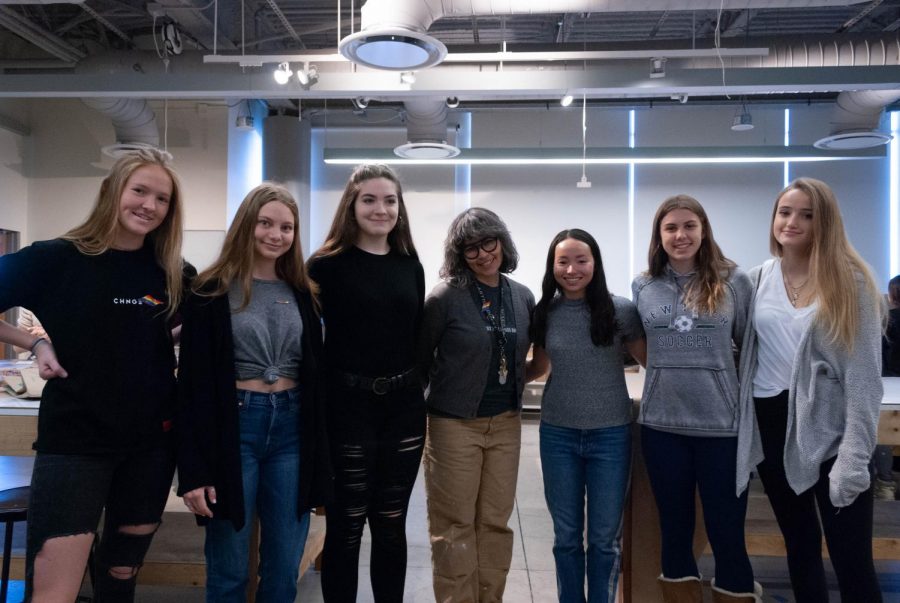Day of Silence struggles to provoke discussion
Some LGBTQ+ students think silent protest misses point
The Day of Silence has been a part of New Trier since the ’90s. However, supporters have begun to question the effectiveness of the protest.
The Day of Silence on April 12 is a student-led national event where supporters take a vow of silence to highlight the silencing and erasure of LGBTQ+ people that takes place at school. Here, the event is orchestrated by the Gender-Sexuality Alliance club (GSA).
Over the years, there has been a decline in participation in the Day of Silence. Matt Stuczynski, one of the sponsors for GSA, outlined a central conflict many supporters feel about the protest.
“Students in the club seem to be uncomfortable with the fact that it’s silent. They think it’s sort of self-defeating. They want it to be more voiceful than silent,” said Stuczynski.
Senior Angela O’Connor, who has been a member of the GSA for 4 years, further described the issue. “When teachers and advisors start talking about the issues LGBTQ people face, the kids who are participating can’t say anything, and that defeats the whole purpose.”
The silence has caused some students to stop participating. Alanna Goldstein, a senior, participated in the protest her freshman year and found the silence to be debilitating to starting conversations about issues the LGBTQ+ community faces.
“I found that teachers were having discussions about LGBTQ+ identities, and I wasn’t able to participate because I was silent, so in future years I just wore a rainbow,” she said.
Other students found the silence to be a compelling aspect of the protest. Maggie Lin, a junior and part of the LGBTQ+ community, described how the silence forces people into the shoes of one who has to hide a crucial aspect of their identity.
“It’s interesting to try to navigate through a day where you can’t speak, people sort of realize that it becomes difficult which parallels the difficulty of reconciling an identity which is hidden.”
Junior Nico Tobon agreed: “I think it’s a great thing to do and a great way to spread a message.”
But for Isabelle Aladda, a junior and member of the GSA club, the lack of participation was a central issue to the effectiveness of silence.
“Conceptually, the silence just doesn’t make much sense, because most people aren’t silent. If people participated, it could be a really good thing.”
While many who support the cause choose not to participate due to the silent nature of the protest, there could be cultural aspects specific to New Trier that is decking participation.
One such factor could be a pressure to conform for students. Stucyinski said, “It [being silent] is tough to do. When students aren’t speaking, they’re sticking out, it’s hard for kids to do that.”
For O’Connor, another reason why student’s don’t participate in the Day of Silence is because of the misconception that our community is shielded from homophobia.
She explained that “a lot of people think, oh, we’re from New Trier, we’re some liberal bubble. It’s a lot more subtle now then just not letting people get married, like when they changed the name of Turnabout and everyone got so mad. It didn’t hurt anyone.”
Some students have found the lack of conversation on days following or leading up to the protest problematic and difficult to navigate.
Sophomore Maya Crystal said, “Nobody talks about it after the day, there’s no debriefing session, so it’s really bad to silence the people who need their voices heard on the one day where people are paying attention.”
O’Connor also found issues with how conversations were being conducted about the protest.
“Teachers don’t really know how to talk about it, it’s just kind of really awkward with participation and things like that. The issue needs to be better integrated into classrooms,” she said.
“I think it just needs to be talked about more because there are a lot of misconceptions about it, people think its just some fun quiet game when it’s a protest. And it is a protest. A march isn’t about going on a walk,” said O’Connor.







































